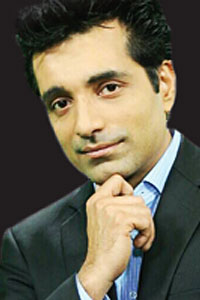
Any frequent traveller will be well aware that grabbing a bite to eat at either of Bangkok's international airports will cost you significantly more than you'd pay for the same meal outside the premises.
Whether buying a coffee from Starbucks or a bowl of noodles at Mango Tree or a Whopper from Burger King, it is noticeable that the prices are much higher than what you'd pay for the exact same products from the same companies in non-airport branches.
As someone who always travels economy class, I am in the habit of getting to any airport well ahead of time, just in case there is a big rush at the check-in desks or passport control.

Umesh Pandey is Editor, Bangkok Post.
I would say more than 90% of the time this means that I end up having to spend at least an hour or so killing time in the airport before boarding.
I have never been much into retail therapy, so the lure of the myriad shops with their glitzy offerings and fancy decor does not really work with me, leaving me with little option but to go and grab some food, a coffee or a beer while I wait for my flight.
Over the years I have questioned many of these outlets in both Suvarnabhumi and Don Mueang airport on why their products are dearer than their equivalents outside and the answers have been roughly the same each time -- it's because the rental rates are far higher.
It is therefore not a surprise to see the cost of food being so high. After all, businesses have to take the fixed cost of long-term rental into consideration before they set their prices.
The Thai media has recently been criticising food and drink retailers for their steep prices in Suvarnabhumi and Don Mueang.
But perhaps we should instead be looking into the exorbitant rental rates charged by the Airports of Thailand Plc (AoT). The costs these businesses incur are, inevitably, passed on to the customers.
AoT, which is 70% state-owned, last week managed to become the world's most valuable airport operator, beating the likes of Spain's Aena SA, when it crossed the market capitalisation line of 1 trillion baht.
AoT infamously granted concessions to companies such as King Power that had encroached on public areas, including the exit areas in Suvarnabhumi airport.
After a public outcry, those areas were relinquished.
The latest outcry on high food prices came after some tourists complained, spurring social media activity on the issue and calls from Prime Minister Prayut Chan-o-Cha for authorities to investigate the matter.
What was surprising was the initial reaction from the newly appointed tourism and sports minister, Weerasak Kowsurat, who told passengers they can avoid paying over the odds by simply eating before they travel to the airport, or waiting until they are on board the plane.
Even more interesting was the response from Deputy Transport Minister Pailin Chuchottaworn, who visited Don Mueang on Friday to check on the issue of high food prices.
After his inspection, the former head of PTT Plc -- yet another state-owned enterprise -- pointed out that there were cheaper food courts operating there, should people not want to eat in a name-brand restaurant.
What Mr Pailin clearly does not realise is that these food courts do not operate air side. Once a traveller clears the security check, the only options available are those that charge premium prices.
These ministers' attitudes sum up what is wrong with many people in power. Both men are only accustomed to luxury and comfort.
When they fly, they are taken through special lanes at airports, and usually they travel in business class, which grants them access to airport lounges or holding rooms, where there is free flow of food and beverages.
"Cattle class" travellers, meanwhile, must brave the queues and the interminable checks, and they have precious little time to think about eating first.
Then, once these processes are over, it could be hours before they board their flight and until food is finally served on board.
What is needed is for the government and possibly the Office of the Ombudsmen to either issue orders for vendors to immediately lower their food prices, or for AoT to lower the rental burden for airport eateries.
They can offset this by continuing to charge the normal rates for the shops that are out of reach for the cattle classes, such as Hermes, Prada, Louis Vuitton and others.
